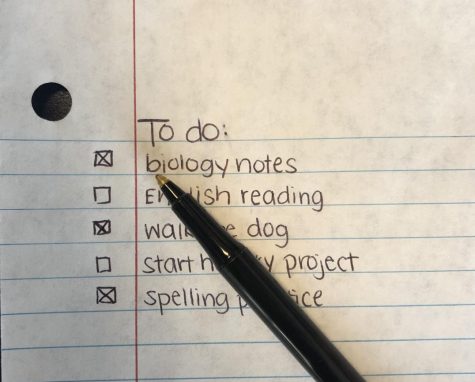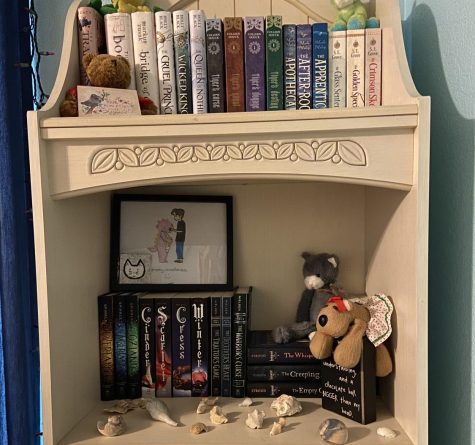Motivating the Unmotivated
Teens, adults struggle to stay successful, focused
March 25, 2021

A pandemic spreads worldwide. It affects almost everyone and anyone. It seizes humanity with an iron grip and refuses to let go. Society calls it “discouragement” or “unmotivation”. It affects children, teenagers and adults alike. No matter the age, demographic, social status–even social media following–people get unmotivated and exhausted. But staying motivated, especially given the times, remains important. It feels hard to start or finish anything sometimes, but staying motivated and finding drive helps lift one out of negative phases in life.
While taking breaks and giving oneself a rest from the busyness of the world is important, staying motivated to finish schoolwork and apply oneself is equally essential for success.
Everybody experiences a funk now and then; they last a day or sometimes months. They come in several forms, but they most commonly leave people feeling discouraged and unmotivated. These funks draw one in as time goes on. The further one falls into the hole of unmotivation, the harder it becomes to climb out. Even getting out of bed seems hard, even impossible sometimes, but once the first step is taken, it gets easier to take more steps out of the funk. Staying active and motivated helps keep these dark and negative phases away.
Easier said than done though. To keep driven, try making a to-do list. A simple first step, but a really important one. Just creating a list and looking ahead in the day makes the tasks seem less daunting and scary. Add small, easy tasks to the list, like make the bed, feed Whiskers. Once finishing an easy task on the to-do list, crossing it out feels satisfying and seeing the list shrink becomes a motivation of itself.
First try completing at least one task a day. Then, move on to two. Then, three. And so on.. Even during breaks–or during an unpredictably long quarantine–finishing projects helps get one out of bed and helps stimulate the brain. With no schoolwork, it becomes easy to waste away the days with Netflix, video games and Twitter. Try cleaning the bathroom, or playing with a pet or cooking lunch instead of ordering fast-food or delivery. The days become more distinguishable and less blended together this way. Plus, it helps to ease back into the routine when break ends.
While the temptation of completing nothing all day and staying in bed is strong, a day becomes a week, and a week becomes months or a year. Try creating a to-do list, finishing easy tasks to help stay motivated, and give rewards when all the boxes become crossed out. Simple additions to a person’s day like this hold the potential to help one stay focused on things they can control as well as help them continue to feel a sense of accomplishment in a time where people struggle to find it.











daisy villegas • Mar 31, 2021 at 8:20 am
i love how it goes with what is currenty happening to our society, it is very motivating for me i can imagine for others. it is very encouraging and gives me advice i should be taking from the article.
alexia.vega • Mar 26, 2021 at 8:44 am
I like your article very much, this was a very easy article to read I understood everything clearly. good job
Kirsten Evans • Mar 26, 2021 at 8:14 am
You did really well showing what all students are thinking, I liked how easy it was to read i wasnt struggling to read through it. Good Job!
Torin Steil • Mar 26, 2021 at 8:10 am
Your editorial was very well written. I like that you gave ideas to help people, to-do lists are very practical. The structure and sequence of your piece was very good.
Alexis Bishop • Mar 26, 2021 at 8:08 am
I appreciated that you provided examples of how to get out of the routine of doing nothing. I’ve recently been struggling with a severe lack of motivation, and I’m glad to see I’m not the only one. I enjoy reading about things that affect society as a whole, like the lack of motivation.
Avi Lujan • Mar 26, 2021 at 8:07 am
I liked how you gave idea’s on how to stay motivated during the day. I thought that was very helpful. And I can’t wait to see more of your ideas and inspiration on this topic.
Fernanda Pérez • Mar 26, 2021 at 8:00 am
your article is pretty good , i like how you try to encourge to keep going
Krystal Lopez • Mar 26, 2021 at 12:36 am
I like how your voice represented all of ours greatly by telling people how stressed and unfocased we are and that breaks help us mentaly and help us function better. I can’t wait to see how you represent and speak up for us in the future.